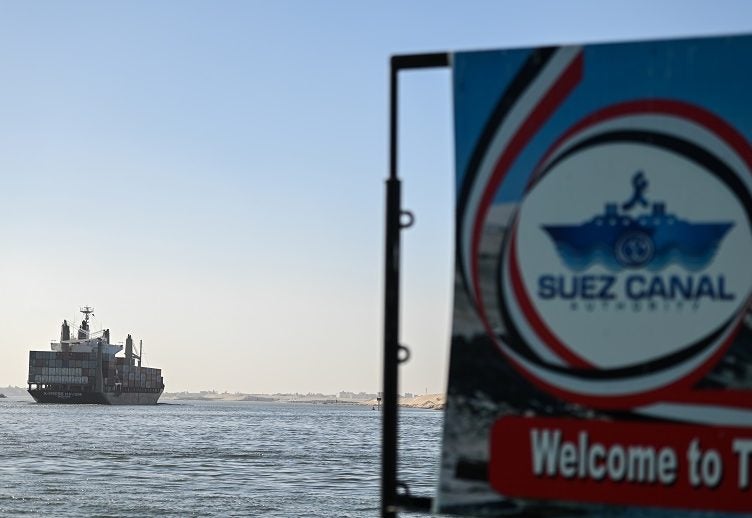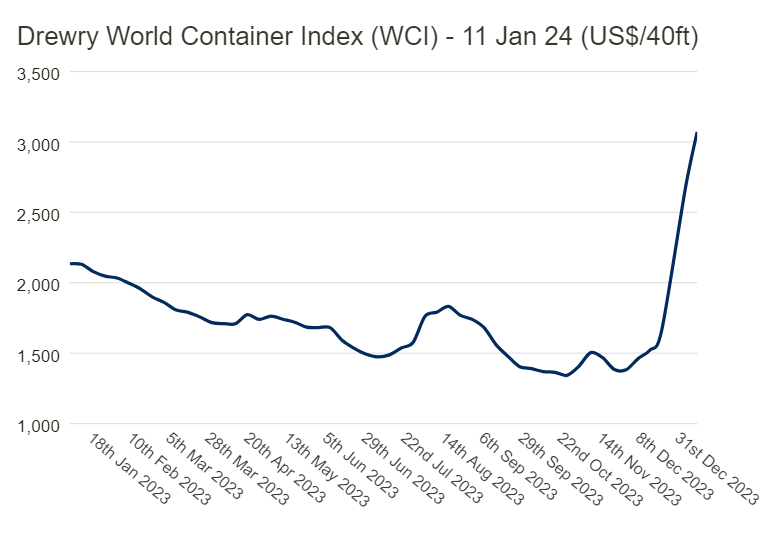
Alongside our daily news coverage, features and interviews, the Just Food team sifts through the week’s most intriguing data sets to bring you a round-up of the week in numbers.
Code red: Houthi attacks spark fresh supply-chain disruption
After the supply-chain upheaval of recent years, boardrooms would’ve been forgiven for some respite in 2024 but the early weeks of the new year have seen yet more disruption to global trade.

Discover B2B Marketing That Performs
Combine business intelligence and editorial excellence to reach engaged professionals across 36 leading media platforms.
The latest boardroom headaches have their source in the Red Sea where the Houthi attacks have upended supplies through one of the world’s most important trade routes and caused companies across industries to reassess their logistics.
The retaliation from a US-led group of countries has added to the uncertainty in the region and the disruption has been further compounded by a drought affecting shipping through the Panama Canal.
The Red Sea/Suez Canal is important in world trade terms. It is said to handle 12% of global trade, while the Suez Canal accounts for nearly a third of the world’s container traffic. The re-routing of ships carrying goods from Asia to Europe and beyond means vessels are travelling 3,500 extra nautical miles around the Cape of Good Hope in South Africa.
So far, there’s little sense of panic in food and beverage circles, or at least not outwardly.

US Tariffs are shifting - will you react or anticipate?
Don’t let policy changes catch you off guard. Stay proactive with real-time data and expert analysis.
By GlobalDataJust Food contacted more than 20 of the world’s largest food and drinks companies to ask how the disruption has affected their supply chains and most insisted they were monitoring what one senior executive described as a “very fluid situation”.
That said, as we detailed this week, some businesses were prepared to admit they have made changes to their logistics, while Italy’s principal farming organisation Coldiretti was especially vocal in expressing its fears about the country’s exports of fresh produce and wine.

Even if the larger food and beverage companies have so far been guarded about the impact on their operations, the disruption is sure to be a topic raised by investors as we head into results season in the coming weeks.
Maritime research and consulting group Drewry has reported a jump in the cost of container freight in the wake of the tensions in the Red Sea. Its most recent update, published on 11 January, showed a 15% increase in the cost of a 40ft container. Compared with the same week last year, the price had jumped 44%.
UK food inflation eases but only slightly
UK grocery inflation eased again in December but was still more than 20% higher than two years ago and at least six times the pace in the US.
The Office for National Statistics (ONS) issued a mixed bag of inflation data this week, with the headline CPI rate edging up for the first time since last February. However, food and soft drinks prices exerted the most downward pressure, while the alcohol and tobacco index helped push up the overall indices for all items.
Grocery inflation, measuring food and non-alcoholic beverages, cooled to 8% last month on an annual basis in terms of the CPI rate, down from November’s 9.2%, when it broke below the 10% barrier. Alcohol and tobacco prices accelerated to 12.9% from 10.2%.
Month-on-month, food and soft drinks prices were unchanged at a 0.4% increase, the ONS reported.
The ONS’s preferred measure tracking food and non-alcoholic beverages – CPIH – softened for a ninth straight month in December, also coming in at 8%, the lowest level since April 2022. It reached a peak of 19.2% in March 2023, the highest in more than 45 years.
Despite the welcome boost for consumers, prices in the UK grocery aisle remain historically high. Last week, the US statistics agency reported food inflation of 2.7% for December and an even lower rate for the food consumed at home component of 1.3%.
The ONS reiterated today the “relatively sharp rises” in UK food inflation over the past two years.
Prices of food and non-alcoholic beverages increased by around 26% between December 2021 and December 2023, the ONS said, as compared to a rise of about 9% over the ten years between December 2011 and December 2021.
Patriot Pickle picked up
Among this week’s M&A was a deal for US pickled-foods manufacturer Patriot Pickle, which was sold by Swander Pace Capital to fellow private-equity firm H.I.G. Capital.
Patriot Pickle manufactures refrigerated pickles, sauerkraut and other pickled vegetables. It supplies restaurants, delis, supermarkets, and distributors and offers private-label food and contract manufacturing.
Last May, the pickle maker acquired domestic peer First Place Foods amid growing consumer appetite for pickled and fermented foods. In 2022, it made a move for Farm Ridge Foods’ pickle assets.
According to GlobalData, Just Food’s parent company, the market for relish and chutney products in the US is forecast to see continued growth in value terms, albeit there is predicted to be an easing in expansion based on CAGR.
Apples sour?
In the UK, listed agriculture group Camellia announced plans to “wind down” operations at fruit supplier Bardsley England after “significant losses”.
Camellia took an 80% controlling stake in its fellow Kent-based business, in 2021.
At the time, Camellia paid £15.7m ($21.8m) for the stake and said it would also make a loan to Bardsley of £9.3m. A few months later, Camellia bought the remaining 20% stake for £1.7m.
However, the group has now revealed Bardsley “has consistently failed to perform to expectation incurring significant losses in each year”, causing an “unacceptable outcome”. Camellia expects to close Bardsley’s operations in its second quarter, which runs to the end of June.
In a filing, Camellia wrote labour costs and high inflation in electricity and fuel due to the war in Ukraine have contributed to this decision.
“Although consumers have experienced significant food inflation, key retail customers have continued to resist any meaningful selling price increases,” it stated.
The company recognised most of the “UK top fruit sector is experiencing difficulties” and “many producers have removed orchards, discontinued planting and in the worst cases stopped farming”.
Last week, Ali Capper, the executive chair of the British Apples & Pears association, told a UK parliamentary hearing that input costs for apple growers had gone up 30% in the past two years. However, growers, she claimed, have only recovered about 8% of the extra cost, she said, while retailers from Lidl to Tesco and Morrisons have pushed up prices by as much as 50%.
Alongside the pressure on profits, the outlook for sales doesn’t look particularly sweet. According to GlobalData, the UK market for apples is set to see low growth in value terms but that would come on the back of lower volumes.
Princes profits sink
The UK food and beverage group, perhaps best known for its tinned tuna, this week filed its latest set of financial results.
Princes, owned by Japan’s Mitsubishi Corp., reported a loss attributable to its owners of £42.7m ($54.3m) in the 12 months to the end of March 2023 – against a profit of £17.2m a year earlier.
An impairment charge of more than £57.7m was central to Princes becoming loss-making during the period, accounts filed with Companies House, the UK’s business register, show.
The canned food and shelf-stable drinks manufacturer also pointed to higher finance charges and rising costs.
The numbers are significant as Princes has been the subject of takeover interest.
Reports emerged in January last year that Mitsubishi had appointed advisers to handle a possible sale of Princes, which it has owned since 1989.
Takeover speculation swirled around the Liverpool-based business throughout last year. Two weeks before Christmas, Newlat, the Italy-based food manufacturer, revealed it was in “very advanced” talks to buy Princes.
The bakery, dairy and pasta supplier’s statement came in the wake of a Sky News report that said Newlat was one of two remaining bidders for Princes, alongside UK-based private-equity firm Epiris. The buy-out house has not commented publicly on its reported interest in the business.
Tellingly, the Companies House report also states: “The directors, along with Mitsubishi Corporation, are reviewing the investment strategy of the business, which could lead to a sale.”





